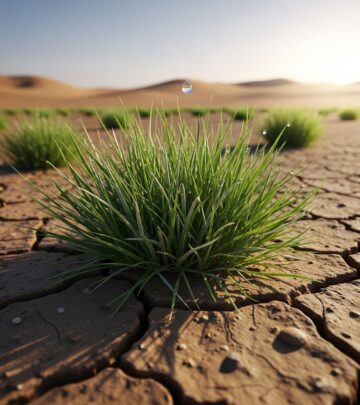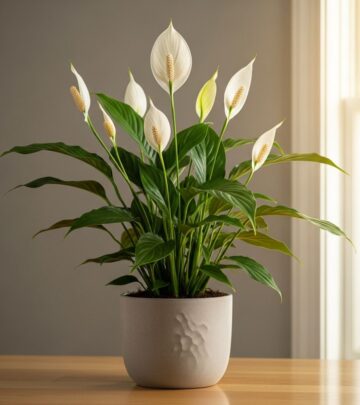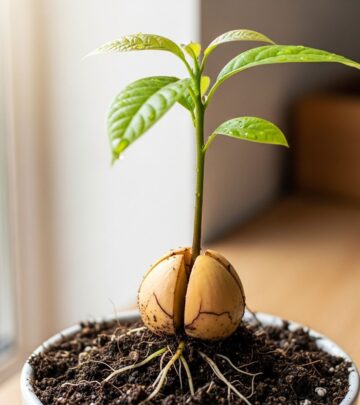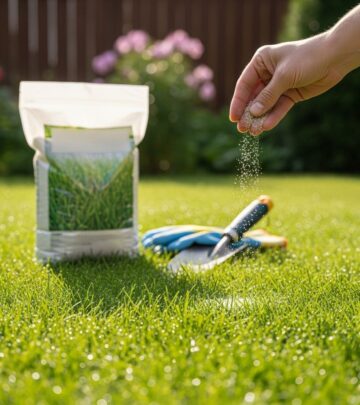Composting Citrus: Guide To Myths, Benefits & Best Practices
Turn kitchen peels into nutrient-rich soil boosters while cutting down on kitchen waste.
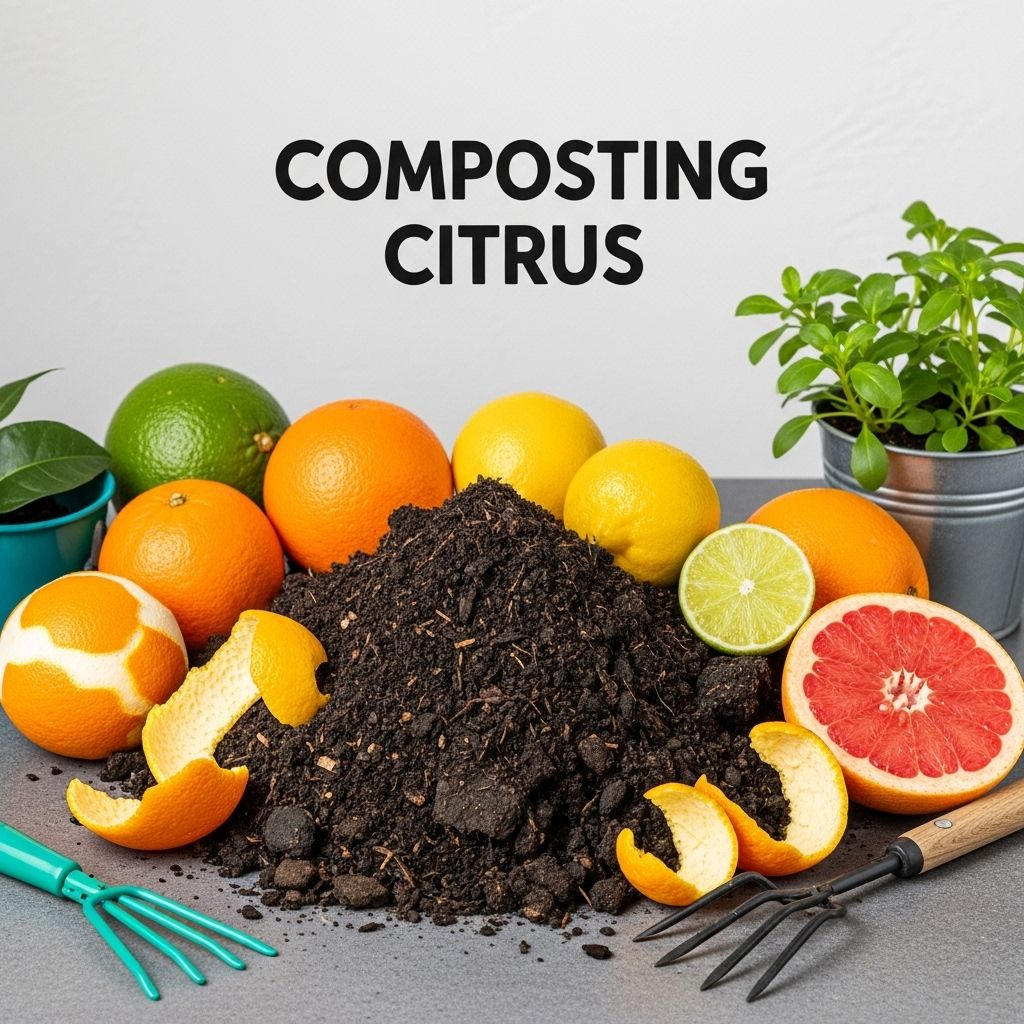
Composting Citrus: Myths, Benefits, and Best Practices
When it comes to composting fruit waste at home, few topics raise as many questions as citrus. Gardeners and composters often wonder if orange peels, lemon rinds, and other citrus scraps belong in the compost bin or if they’re more trouble than they’re worth. This comprehensive guide addresses these concerns, debunks myths, and offers practical steps for successfully composting citrus materials.
Can You Compost Citrus? The Truth Behind the Myth
Contrary to popular belief, it is almost always perfectly safe to compost citrus, including peels, fruits, and even small pruned branches, provided they are added thoughtfully and prepared correctly. Warnings about citrus harming worms, upsetting compost pH, or inhibiting decomposition are often exaggerated. Many concerns stem from outdated advice or confusion over best practices.
- Misinformation: The idea that citrus peels kill worms or harm soil is unsubstantiated when compost is properly managed.
- pH Concerns: Citrus is acidic, but in the context of a large, well-balanced compost pile, it does not significantly alter the overall pH.
- Compost Worms: While worms may avoid pure citrus, when thoroughly mixed and decomposed within a pile, citrus ceases to be an issue.
With correct technique, citrus scraps can safely become a valuable part of your composting routine.
Why Compost Citrus?
Using citrus scraps in compost offers both environmental and practical benefits:
- Reduces landfill waste from citrus peels and fruit scraps, lowering your household’s carbon footprint.
- Provides nutrient diversity by adding trace minerals, vitamins, and additional organic matter to the compost.
- Encourages complete recycling of kitchen waste, especially during peak citrus season.
Despite their tough skins, citrus peels are a resource—especially when processed correctly.
Getting Started: How to Compost Citrus the Right Way
Proper preparation and attention to compost balance ensure citrus breaks down efficiently and safely:
1. Prepare Your Citrus Scraps
- Cut peels into small pieces (ideally less than 2 inches across) to speed decomposition and prevent clumping.
- Consider drying the peels before composting; this can help them decompose faster and discourage pests.
- Remove any seeds from the fruit before composting, especially for cold compost piles, as seeds may sprout later.
2. Balance Your Compost Pile
- Mix citrus with “browns” such as shredded paper, cardboard, dried leaves, or straw. Avoid putting in large, wet citrus clumps by themselves.
- Maintain a carbon-to-nitrogen (C:N) ratio of roughly 25-30:1 for optimal composting.
- Ensure the pile remains moist but not soggy.
3. Aerate and Monitor
- Turn the compost pile regularly (every 1–3 weeks) to promote aeration and distribute citrus evenly.
- Monitor decomposition and adjust the balance of “greens” (kitchen scraps, citrus) and “browns” as needed.
With these steps, citrus peels can be integrated into most backyard compost systems.
Hot Compost vs. Cold Compost: Which Is Best for Citrus?
There are two basic approaches to home composting: hot compost (active, heated piles) and cold compost (slower, passive piles).
| Compost Method | Hot Compost | Cold Compost |
|---|---|---|
| Speed | Rapid (weeks to months) | Slow (months to over a year) |
| Effort | Requires regular turning & monitoring | Minimal effort; mostly left alone |
| Citrus Preparation | Small pieces, mixed in well—high heat breaks down oils & acids quickly | Crucial to cut small & avoid seeds, as low heat may allow seeds to sprout |
| Pest & Disease Control | High heat destroys pathogens & seeds | Lower temperatures less effective at killing pests & seeds |
Guidelines for Hot Composting Citrus
- Place citrus in the center of the pile where temperatures are highest.
- Keep the pile well-aerated and moist for optimal microbial activity.
- High heat helps break down citrus oils and acids quickly, minimizing any risk of lingering acidity.
Guidelines for Cold Composting Citrus
- Cut citrus into very small pieces for easier breakdown.
- Never add whole fruits or uncut peels, which may resist decay and create clumps.
- Keep citrus towards the center of the pile, where decomposition is most active.
- Avoid adding seeds, as lower heat is insufficient to kill them, leading to potential sprouting in finished compost.
In summary, hot composting is ideal for large amounts of citrus, rapid decomposition, and assured seed destruction. Cold piles can handle citrus in moderation—as long as pieces are small, seeds are excluded, and you are patient.
Common Concerns About Composting Citrus (And Solutions)
Common myths surround citrus composting. Here, we address some frequently cited problems and how to resolve them:
- Strong scent attracts pests
- Solution: Chop citrus finely, bury in the middle of the pile, and cover with leaves or soil to reduce odors and pest interest.
- Slow decomposition
- Solution: Cut peels small, keep the pile moist, and ensure a good mix of greens and browns for active microbial breakdown.
- Potential for mold
- Solution: Small pieces and frequent turning allow air to circulate and prevent mold pockets.
- High acidity harms worms
- Solution: Limit citrus additions in worm bins; for regular hot compost, acidity is diluted by the entire pile.
By observing proper compost basics, these issues are readily managed. It is only in systems that rely entirely on worms—as in small-scale vermicomposting—that citrus is best limited.
Tips for Composting Citrus Successfully
- Always chop citrus into small, manageable pieces for rapid breakdown.
- Bury citrus scraps inside the pile instead of scattering on the surface. This promotes decomposition and hides scent from animals.
- Keep your compost moist—slightly damp to the touch—to prevent slow decay.
- Turn your pile regularly to mix materials and encourage aerobic activity.
- Balance with extra carbon-rich “browns” (cardboard, dead leaves) to neutralize acidity and allow microbes to flourish.
- Exclude seeds and large, whole citrus fruits, which resist decay and might sprout if left undestroyed.
When Should Citrus Be Avoided in Compost?
Citrus should be added in moderation, especially in these scenarios:
- Vermicomposting (worm bins): Most composting worms dislike large amounts of citrus, especially if it molds.
- Excessive amounts: If you juice large volumes of citrus often, feed your pile in batches rather than all at once. This avoids overwhelming the microbial and fungal balance.
- If your pile is too small/slow: In tiny, poorly maintained, or seldom-turned compost bins, citrus peels can accumulate and attract pests or resist decomposition.
For most backyard composters, citrus is fine in moderation and with good pile management.
How Long Does It Take for Citrus to Compost?
The speed of decomposition depends on several factors:
- Size of pieces: Smaller pieces break down in a few weeks in a hot pile, but whole peels may persist for months.
- Temperature: Hot, actively managed piles complete the process faster than cold, passive bins.
- Moisture/Aeration: Well-aerated, moist piles support best microbial breakdown.
On average, expect chopped citrus peels in a hot compost pile to fully decompose in 2–3 months; in cold piles, it can take 6 months to one year. Entire fruits or thick, whole peels will decompose much more slowly and may even persist in the finished compost if not managed carefully.
What Else Can You Do With Citrus Peels?
Besides composting, citrus peels have numerous alternative uses:
- Homemade cleaners: Infuse peels in vinegar for a natural, citrus-scented surface cleaner.
- Pest repellents: Dried or fresh peels can deter ants and cats from garden beds.
- Natural fire starters: Dried peels burn well due to their natural oils.
- Air freshener: Simmer with cinnamon and cloves for a natural scent boost indoors.
Frequently Asked Questions (FAQs)
Q: Can I compost whole oranges or lemons?
A: It’s better to cut citrus fruit and peels into smaller pieces before composting. Whole fruits can resist decay, cause mold, or attract pests.
Q: Is it safe to compost citrus in worm bins?
A: While a small amount of citrus can go into a worm bin, large quantities should be avoided. Citrus is acidic and can harm sensitive compost worms, so use sparingly or opt for traditional compost piles instead.
Q: Does composting citrus make finished compost acidic?
A: In a balanced mix, the acidity of citrus is neutralized over the course of decomposition, resulting in a finished compost with a near-neutral pH.
Q: Can composted citrus be used around edible plants?
A: Yes. Once fully decomposed, citrus is perfectly safe for use in any garden bed, including beds for edible crops.
Q: How do I prevent citrus from making my compost smell?
A: Always bury citrus peels and fruit in the center of the compost pile, chop them small, and cover with “brown” materials like leaves or soil to help control odors.
Summary and Final Tips
Composting citrus is not only possible—it is an important step in reducing household food waste and enriching your garden’s soil. By chopping peels, balancing with plenty of carbon-rich “browns,” and maintaining a healthy, active pile, you can safely compost all manner of orange, lemon, lime, and grapefruit scraps. Avoid old myths, use moderation where necessary, and enjoy the benefits of a more complete composting routine!
References
Read full bio of Srija Burman



